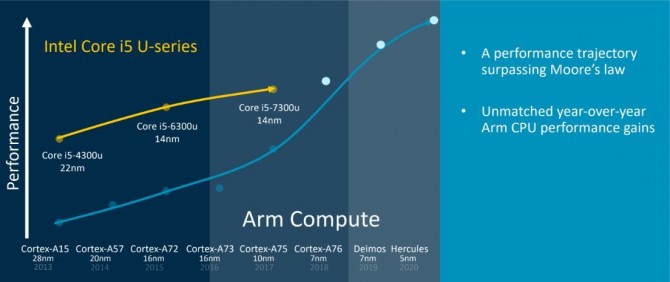MacBooks Could Ditch Intel for ARM Chips Sooner Than You Think
Sign up to receive The Snapshot, a free special dispatch from Laptop Mag, in your inbox.
You are now subscribed
Your newsletter sign-up was successful
Multiple reports published in the past few months claim Apple will ditch Intel for ARM-based CPUs. Now, ARM has added fuel to the fire by releasing a roadmap that suggests its laptop-class CPUs will surpass Intel's offerings within a few years.
The forecast promises a 15 percent year-over-year increase in CPU performance by 2020. The chip maker said it would outpace Moore's Law by more than doubling transistor density every two years. The next few CPUs — codenamed "Deimos" and "Hercules" — are expected to be 7 nanometers and 5nm, respectively.
With the release of Hercules, ARM believes it can catch up, and perhaps even surpass, Intel by 2020. If it can pull off its ambitious projections, Apple may be eager to release ARM-based Macs sooner than expected.
“It’s a compelling roadmap and will most certainly get Intel’s attention," Tom Mainelli, program vice president at market research firm IDC, told Laptop Mag.
"Intel won’t be sitting still, and so it is reasonable to presume it will get its house in order and will have higher-performing X86 chips in that time frame, Mainelli continued. "But it seems obvious to me that Intel is about to have a real battle on its hands, as ARM performance seems set to scale up faster than Intel can scale down the power requirements of its chips."
How certain are analysts that Apple will go all-in on ARM? In April, Bloomberg reported that Apple was working on an ARM-based laptop CPU called the Kalamata. 9to5Mac followed up with a report in May that said a project called Star is currently in development, and may be an ARM-based touchscreen hybrid.
"Apple almost certainly has a group in a lab somewhere planning to move macOS to ARM, even if just as a contingency," Avi Greengart, a research director of consumer platforms and devices at GlobalData, told Laptop Mag in an email. "Apple has more control over the software stack on top of the silicon than other laptop vendors, and it has switched chip architectures before."
Sign up to receive The Snapshot, a free special dispatch from Laptop Mag, in your inbox.
There are several reasons why Apple would want to shift its laptops to ARM-based chips. For one, ARM's low-power CPUs enable long battery life and thinner, fanless designs. And since ARM only licenses out its CPU architecture, Apple would have the flexibility to make a custom chip designed specifically for macOS that offers seamless integration between Apple products.
"Apple loves to own the whole widget and has done amazing work with its A-class processors for iPhones and iPads," Mainelli told Laptop Mag. "It’s a big lift to make such a switch, but we’ve seen them do it before and I wouldn’t be surprised if they had long-term plans around ARM-based Macs.”
Even if Apple delays the transition away from Intel, the current leading laptop CPU manufacturer could find itself in a difficult position, especially if its struggle to create a 10nm process continue.
"The biggest shock is that ARM appears so far ahead of Intel moving to smaller 10mm and 7mm processes; Intel used to lead the world in semiconductor manufacturing by a wide margin," Greengart said.
We have reached out to Apple and will update this article if we learn more.
Phillip Tracy is the assistant managing editor at Laptop Mag where he reviews laptops, phones and other gadgets while covering the latest industry news. After graduating with a journalism degree from the University of Texas at Austin, Phillip became a tech reporter at the Daily Dot. There, he wrote reviews for a range of gadgets and covered everything from social media trends to cybersecurity. Prior to that, he wrote for RCR Wireless News covering 5G and IoT. When he's not tinkering with devices, you can find Phillip playing video games, reading, traveling or watching soccer.


